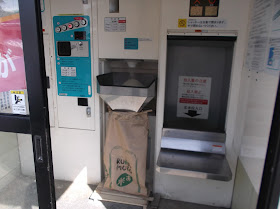I'm talking about the variety of rice that has received the highest score in the shokumi (taste, flavor, palatability) ranking, as determined by the Japan Grain Inspection Association (KOKKEN).
日本穀物検定協会が決めた食味ランキングで最高得点を取った米の品種のことです。
I ordered 30 kg of this variety of rice, and milled it at the milling station today.
この品種のお米を30 kg注文し、今日、精米所で精米しました。
Such unmanned milling stations are here, there, and everywhere in Japan. First, you have to put in some 100-yen coins, one for 10 kg of rice. I put in three 100-yen coins.
こんな無人の精米所は日本のいたる所にあります。まず100円玉を幾つか、お米10 kgに対して一枚入れます。私は100円玉を3枚入れました。
Then, load your rice into the hopper.
そして、ホッパーにお米を入れます。
Then, select a button of your preference. This advanced mill has five buttons: 50%, 70%, standard (mochi rice), extra white, and clean milling (for non-wash rice). I selected the standard button.
そして、好みのボタンを押します。この最高機種にはボタンが5つあります: 5ぶ、7ぶ、標準(もち)、上白(じょうはく)、クリーン精米(無洗米)。私は標準ボタンを選択しました。
I can't wait to eat Japan's No. 1 rice!
日本一のお米を早く食べたいです!
To be continued.
続く。







And how did it taste, as good as hoped for? It is interesting to learn about different rice varieties, not that there is any chance to buy them here (we may have to talk about the best potatoes instead or beer). Looking at our store shelves there are only a few rice products from only a few companies and they are simply catagorized into long grain, short grain (aborio or sushi rice or sticky rice), parboiled, brown rice, rice mixed with wild rice, yasmine, basmati. But not named after region or such.
ReplyDeleteVery neat! I was just telling my mother about the milling stations in Japan. Did you take any pictures of the rice before it was milled?
ReplyDeleteKiki: We'll probably taste it this evening or maybe tomorrow. Then I will report back.
ReplyDeletemuskratbyte: I forgot to take photos of it before milling it. Silly me.
Lucky you!!! I'm impatient to see how you appreciated it.
ReplyDeleteSissi: Yes, I'm lucky, but I spent 13,000 yen for 30 kg of it.
ReplyDeleteIf I had good rice at this price here, I would jump with joy! It's less than I pay for my Yumenishiki (about 3 200 yen for 5kg).
ReplyDeleteSissi: Here in Niigata, I can get 10 kg Koshiibuki produced in Niigata for around 3,500-4,200 yen. Koshihikari produced in Niigata is a little more expensive.
ReplyDelete